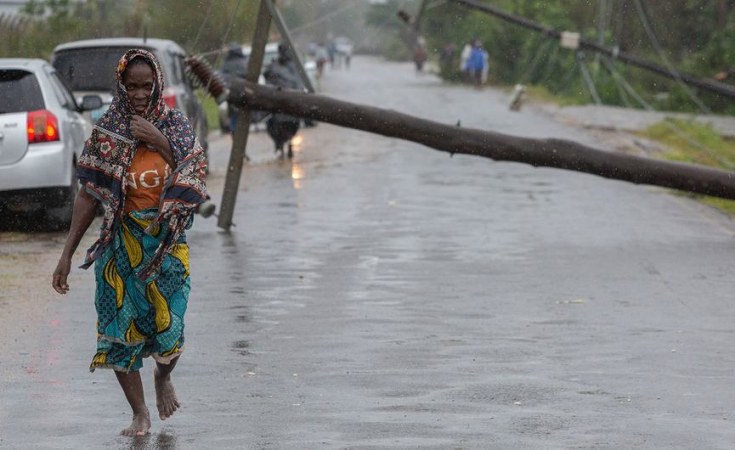Natural disasters, extreme weather events, conflict and political instability can devastate local health systems, displace thousands of people and fuel the spread of disease.
HIV, tuberculosis (TB) and malaria disproportionately impact people caught in crises - which is why more than one-third of Global Fund investments support communities and countries navigating complex environments and emergencies.
Often, women are at the forefront of the response. Female health workers and advocates provide vital care to communities even as they, themselves, recover.
On International Women's Day, we shine a light on some of these heroic women.
Oxana Rucsineau, a former schoolteacher living in Bălƫi, Moldova, contracted TB in her late twenties. Overcome with dizziness and fatigue, she was unable to work for three years.
Today, Oxana is working to ensure that others don't suffer from this preventable, treatable disease - an increasingly critical challenge as thousands of displaced people flow into and move through Bălƫi, located just 60 kilometers from the Ukrainian border.
"There are still people who we don't reach, or who we don't get to in time," Oxana said.
The Global Fund/Vincent Becker Oxana met her husband, Pavel, in treatment for drug-resistant TB. They bonded over the challenges they faced to get well, and the stigma that came with their diagnoses.
In 2010, the pair founded the Society of Moldova against Tuberculosis (SMIT) to protect the rights of people affected by TB, including refugees.
SMIT connects them with comprehensive care - including legal and mental health services for those shunned or otherwise discriminated against because of the disease.
Read more about Oxana and women fighting TB in Moldova.
Even before the war that destroyed large parts of Homs National Hospital in Syria, oxygen supplies were limited. During reconstruction - which continues to this day - the hospital added an oxygen generator.
Head Nurse Rahaf Ali Fatoum joined the hospital the day it reopened. Some days, every one of her patients requires medical oxygen.
"We can feel the difference this makes to the patients," Rahaf said. "And we are now able to take on more cases and treat them faster."
The Global Fund/Tafaseel Advertising Agency Rahaf administers oxygen to patients of all ages, with a variety of ailments: asthma, those recovering from surgery or grappling with illnesses tied to HIV or TB.
The generator enables Rahaf to focus on her patients and concentrate on the most urgent needs in a fast-paced environment. "It has made our work easier," she said.
Read more about Homs National Hospital.
Cyclone Freddy brought more rain in eight weeks than Mozambique had seen in the previous year. Across the country, gale-force winds and floods ruined homes and flooded cities.
Júlia Lúis is a community health worker in Upala-a village in the Boane district. After the storm, the road that Júlia used to get to work was flooded.
But as soon as it cleared, Júlia and her fellow health workers trekked hundreds of kilometers to reach the people who had been worst affected.
The Global Fund/Tommy Trenchard/Rooftop and UNICEF/UN0820855/Zuniga Cyclone Freddy created the perfect conditions for a malaria outbreak. Júlia used the smartphone app upSCALE to identify high-risk patients and keep track of who had been tested and treated. She and her colleagues distributed medicines and chlorine tablets to families throughout the district.
It started as a blog. The blog became an online community. The online community became an organization that fights for Burkina Faso's women and girls every day: Héroïnes du Faso.
Farida Tiemtoré founded Héroïnes to support and empower women and girls like her, who are working to overcome inequality, conflict and insecurity in Burkina Faso.
The country has high rates of child marriage and gender-based violence. Due to conflict and insecurity, the UN estimates that 1 in 4 people in Burkina Faso are in need of humanitarian assistance.
The Global Fund/Olympia de Maismont Many of the young women that Farida meets have never seen or used contraceptives or taken a test for sexually transmitted infections.
"In our talks, we teach young women to negotiate the use of condoms with their partners," Farida said. "Girls tell us that they feel better equipped."
COVID-19 struck just as Dr. Khiếu Thị Thúy Ngọc, Deputy Laboratory Manager at the National Lung Hospital in Hanoi, was beginning to see progress on Viet Nam's fight against TB.
The pandemic overwhelmed the health system and its providers. A new crisis emerged: a critical shortage of trained, experienced healthcare workers.
Dr. Khiếu has dedicated her career to treating TB patients. Today, she travels the country training the next generation of doctors, technicians, laboratory staff and other healthcare workers so that they can take up the cause.
The Global Fund/Quinn Ryan Mattingly This includes training providers on GeneXpert machines, rapid diagnostic tools that can help identify people with TB quickly and efficiently.
In April 2023 alone, Dr. Khiếu certified more than 115 new technicians in Hanoi and Ho Chi Minh City.
Read more about Dr. Khiếu and her colleagues.
Fazila's aunt died in childbirth when she was 16 years old. She decided to become a healthcare provider to help other women avoid the same fate.
At age 25, another calamity: Catastrophic floods drowned her village in Sindh province, Pakistan. For months, large parts of the country were under water.
Fazila and her family were suffering, but she recognized her skills were in demand more than ever.
A midwife by training, Fazila began working on mobile health units dispatched by Indus Hospital and Health Network to reach those most affected by flooding. Half of the patients Fazila treated at the mobile clinic tested positive for malaria.
The Global Fund/Saiyna Bashir/Panos Fazila is steadfast in the face of crisis, but she understands that disaster could strike again.
"The flooding will keep happening so we should make plans, so we are better prepared to deal with these difficulties," she said.
Written by Elise Walter.


